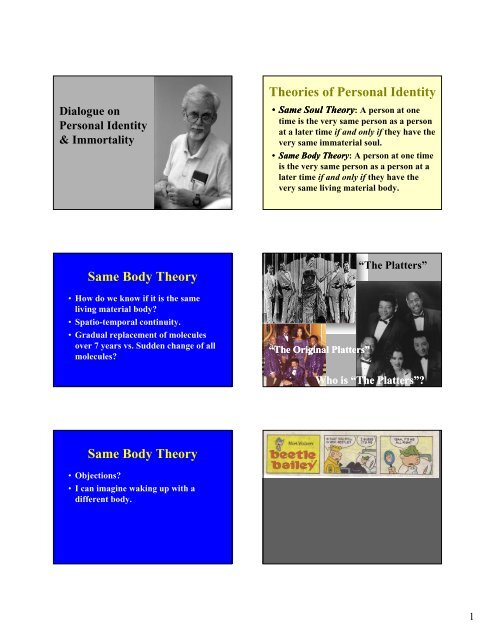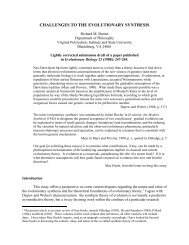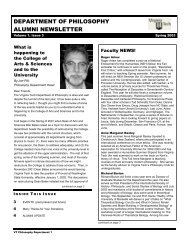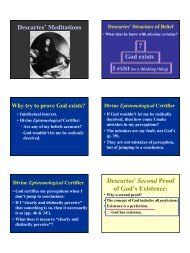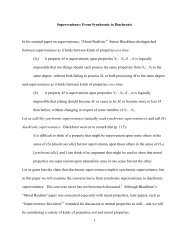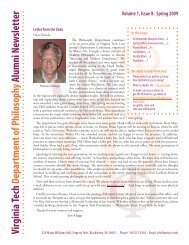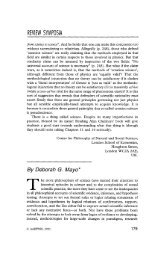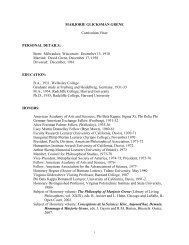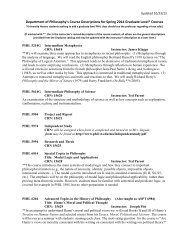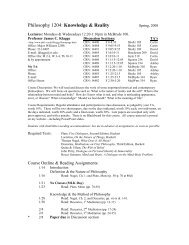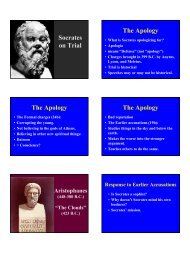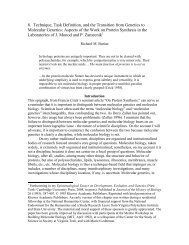Theories of Personal Identity
Theories of Personal Identity
Theories of Personal Identity
You also want an ePaper? Increase the reach of your titles
YUMPU automatically turns print PDFs into web optimized ePapers that Google loves.
Dialogue on<br />
<strong>Personal</strong> <strong>Identity</strong><br />
& Immortality<br />
<strong>Theories</strong> <strong>of</strong> <strong>Personal</strong> <strong>Identity</strong><br />
• Same Soul Theory: A person at one<br />
time is the very same person as a person<br />
at a later time if and only if they have the<br />
very same immaterial soul.<br />
• Same Body Theory: A person at one time<br />
is the very same person as a person at a<br />
later time if and only if they have the<br />
very same living material body.<br />
Same Body Theory<br />
• How do we know if it is the same<br />
living material body?<br />
• Spatio-temporal t continuity.<br />
it<br />
• Gradual replacement <strong>of</strong> molecules<br />
over 7 years vs. Sudden change <strong>of</strong> all<br />
molecules?<br />
“The Original Platters”<br />
“The Platters”<br />
Who is “The Platters”?<br />
Same Body Theory<br />
• Objections?<br />
• I can imagine waking up with a<br />
different body.<br />
1
Franz Kafka<br />
“Metamorphosis”<br />
Cockroach<br />
Same Body Theory<br />
• I can imagine waking up with a<br />
different body.<br />
• So it is false that: t<br />
– Different body → different person.<br />
• Same body is not a necessary<br />
condition for personal identity.<br />
Same Body Theory<br />
• What is it about this being in a<br />
different body that makes it the same<br />
person as some earlier person?<br />
• Having memories <strong>of</strong> that earlier<br />
person’s experiences?<br />
<strong>Theories</strong> <strong>of</strong> <strong>Personal</strong> <strong>Identity</strong><br />
• Same Soul Theory: A person at one<br />
time is the very same person as a person<br />
at a later time if and only if they have the<br />
very same immaterial soul.<br />
• Same Body Theory: A person at one time<br />
is the very same person as a person at a<br />
later time if and only if they have the<br />
very same material body.<br />
• Psychological Continuity Theory.<br />
Psychological Continuity<br />
• Psychological Continuity Theory: A<br />
person at one time is the very same<br />
person as a person at a later time if and<br />
only if the person at the later time<br />
remembers experiences <strong>of</strong> the person at<br />
the earlier time?<br />
• No: Then I wouldn’t be that child who<br />
went to kindergarten, or whatever I<br />
don’t remember.<br />
2
Psychological Continuity<br />
• Psychological Continuity Theory: A<br />
person at one time is the very same<br />
person as a person at a later time if and<br />
only if the person at the later time is<br />
psychologically continuous with the<br />
person at the earlier time.<br />
• Psychological Continuity: There is a<br />
chain <strong>of</strong> person-stages connected by<br />
episodic memory.<br />
Psychological Continuity<br />
Person-stages:<br />
A B C<br />
Experience x<br />
Memory <strong>of</strong> x<br />
Experience y<br />
Experience z<br />
Memory <strong>of</strong> y<br />
1988 1996 2006<br />
Psychological Continuity<br />
• Psychological Continuity: There is a chain <strong>of</strong><br />
person-stages connected by episodic memory.<br />
• A, B, and C, are psychologically continuous<br />
with each other. So: A, B, and C are all<br />
person-stages <strong>of</strong> the very same person.<br />
• Psychologically continuous → same person.<br />
– Sufficient condition.<br />
• Not psychologically continuous → different<br />
person.<br />
– Necessary condition.<br />
The case <strong>of</strong> Clive Wearing<br />
• Viral Encephalitis<br />
in 1985<br />
• Significant ifi brain<br />
damage to<br />
hippocampus.<br />
• Episodic memories<br />
reach back less<br />
than 30 seconds.<br />
Requirements for Memory<br />
• What is memory?<br />
• I (really) remember X:<br />
• I have an experience as though I<br />
remember x.<br />
Memory<br />
• Is it possible to subconsciously<br />
remember something without realizing<br />
it?<br />
• After about 7 years Clive developed<br />
some few episodic memories which he<br />
couldn’t consciously recall, but could<br />
be displayed in what he said or did.<br />
3
Requirements for Memory<br />
• What is memory?<br />
• I (really) remember X:<br />
• I have an experience as though I<br />
remember x.<br />
• X has to have happened to me.<br />
• Account <strong>of</strong> memory<br />
can’t presuppose<br />
personal identity.<br />
• No false memories: If<br />
it didn’t happen, you<br />
can’t remember it.<br />
• E.g., hypnotism,<br />
psychotherapy?<br />
Memory<br />
Requirements for Memory<br />
• What is memory?<br />
• I (really) remember X:<br />
• I have an experience as though I<br />
remember x.<br />
• X has to have happened.<br />
• The memory <strong>of</strong> x has been produced<br />
in the right way.<br />
Memory<br />
• No implanted memories: You have to<br />
remember it in the right way.<br />
• E.g., No repeated retellings.<br />
• What is “the right way”?<br />
• What is the right way ?<br />
• Experience registers in brain.<br />
• What about Star Trek transporter<br />
machine?<br />
• God?<br />
• Experience reliably, not arbitrarily, reproduced.<br />
4


